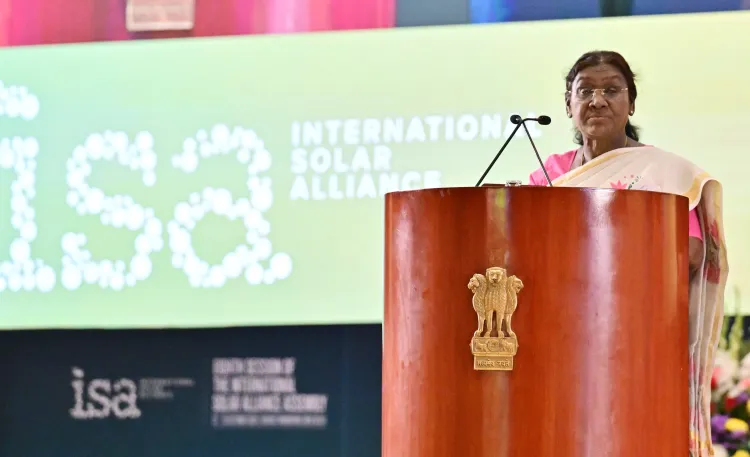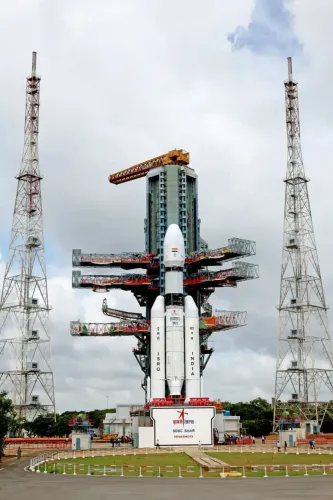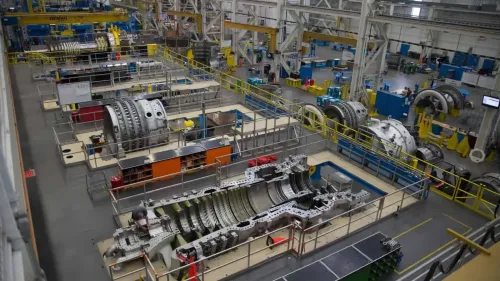Can India Become a Global Solar Energy Hub by 2050?

Synopsis
Key Takeaways
- India aims to be a global solar energy hub by 2050.
- Focus on innovation, manufacturing, and knowledge exchange.
- Emphasis on energy equity and social equity.
- Commitment to combating climate change.
- Importance of ecological balance in solar expansion.
New Delhi, Oct 28 (NationPress) President Droupadi Murmu stated on Tuesday that by 2050, India aspires not only to fulfill its clean energy objectives but also to become a crucial hub for global solar demand, fostering innovation, manufacturing, and knowledge exchange.
While addressing the eighth session of the International Solar Alliance (ISA) assembly at Bharat Mandapam, President Murmu confirmed that India is well on its way to establishing itself as a global solar energy leader.
She emphasized the nation’s achievements in renewable energy, surpassing targets ahead of schedule, and laid out a vision focused on gathering global solar demand and enhancing clean energy innovation.
The ISA symbolizes humanity’s collective ambition to utilize solar energy for inclusion, dignity, and shared prosperity, according to President Murmu.
She encouraged all Member Countries to look beyond mere infrastructure and prioritize the lives of individuals. The President called for this Assembly to devise a collaborative action plan that connects solar energy with job creation, women’s leadership, rural livelihoods, and digital inclusion.
“Our progress should be gauged not just in megawatts but in the lives brightened, families empowered, and communities transformed. We must also focus on technological advancements and sharing cutting-edge technologies for maximum benefit,” remarked the President.
Highlighting the global impact of climate change, President Murmu stressed the necessity for urgent action against this threat. India is firmly dedicated to combating climate change and is taking robust measures. She pointed out that the ISA plays a crucial role in addressing this global challenge by promoting the adoption and utilization of solar energy.
She articulated that the principle of inclusion is central to India’s development narrative. The nation’s success in providing electricity to the most remote regions reinforces the belief that energy equity is fundamental to social equity. Access to affordable and clean energy empowers communities, stimulates local economies, and creates opportunities that extend far beyond electricity provision. Solar energy represents not only power generation but also empowerment and inclusive growth.
President Murmu underscored the importance of ensuring that the expansion of large-scale solar projects also preserves the ecological balance of the region, as environmental conservation is the core reason for transitioning to green energy.
She further emphasized a dedicated approach, not just for individual countries but for the entire world, considering both current and future generations. The President expressed confidence that the discussions and outcomes of this Assembly will mark a significant milestone in solar energy production, contributing to a more inclusive and equitable world.
During the event, Minister of Consumer Affairs and New and Renewable Energy, Pralhad Joshi, shared insights into India’s impressive renewable energy journey, which has transformed the nation from a minor player to the world's fourth-largest in renewable energy capacity, increasing from 81 GW in 2014 to 257 GW today.
“Under the visionary leadership of Prime Minister Narendra Modi, India achieved its target of 50% energy capacity from non-fossil sources, five years ahead of the 2030 deadline, making clean energy accessible and affordable,” Joshi informed attendees.
Through transformative initiatives like PM-KUSUM, PM Surya Ghar Muft Bijli Yojana, PM-JANMAN, and 'One Sun, One World, One Grid', India is at the forefront of ensuring energy justice, empowering the underprivileged, and enhancing South-South cooperation, Joshi added.
The ISA, led by India, is a treaty-based intergovernmental organization dedicated to facilitating a solar-powered future, particularly addressing the energy needs of developing nations.









